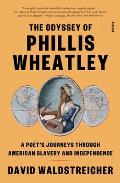“Shall we in equal strains return / Thy spleen, and answer scorn with scorn?”
The Journal of American Constitutional History just published (open access, and thus available to all) David Waldstreicher’s article “Racism, Black Voices, Emancipation, and Constitution-Making in Massachusetts, 1778.”
Waldstreicher is a Distinguished Professor of History at the City University of New York and author of The Odyssey of Phillis Wheatley: A Poet’s Journeys Through American Slavery and Independence, just issued in paperback, and Slavery’s Constitution: From Revolution to Ratification.
In that biography, Waldstreicher appended a number of poems published anonymously in the New England press that he “tentatively” attributes to Phillis Wheatley (or Phillis Peters, as she became after her marriage in late 1778).
One appeared in the 12 Feb 1778 Independent Chronicle in the midst of Massachusetts’s debate over ratifying a new constitution. This would be an unusual work for Wheatley, in both subject and form. She had never before exchanged literary insults in the weekly press, nor published in the satirical mode, and she rarely wrote in tetrameter. (One exception to the last pattern was “Ode to Neptune,” subject of my article for Commonplace.)
On the other hand, this poem was a direct response to one that attacked the idea of rights for black people in Massachusetts and used the name “Phillis” to refer to a politician’s black mistress. It shows poetic skill and some rhetorical resemblances to Wheatley’s published work, and it’s hard to imagine anyone else in the state having more reason to write it.
Waldstreicher’s paper goes into more detail than his book about the poem—its political context, its literary grounding, the verses it responded to, the reasons to link it to Wheatley. In doing so, it offers a snapshot of the state’s process of creating a constitution. That 1778 document proved to be a dead end, but this debate turned out to have a strong effect on the successful 1780 document.
Ironically, in the paper Waldstreicher stays just clear of stating that Wheatley wrote this poem, acknowledging other possibilities and calling it “Wheatleyan.” That may account for why the title of the paper doesn’t include Wheatley’s name, just “Black Voices.”
In contrast, the book posits “If this poem is by Wheatley” and then proceeds to treat it as her work, indeed “a key work in her oeuvre.” That approach could have been demanded by how many other topics a biography has to cover, leaving less chance to pause and work through nuances. Or it could have been allowed by a different level of peer review pressure. Either way, it’s clear that Waldstreicher is convinced this poem is most likely Phillis Wheatley’s own commentary on the state of racial politics in Massachusetts in 1778.
And with the article freely available, everyone has a chance to study the poem, the verses it replied to, and the multi-layered analysis.
Waldstreicher is a Distinguished Professor of History at the City University of New York and author of The Odyssey of Phillis Wheatley: A Poet’s Journeys Through American Slavery and Independence, just issued in paperback, and Slavery’s Constitution: From Revolution to Ratification.
In that biography, Waldstreicher appended a number of poems published anonymously in the New England press that he “tentatively” attributes to Phillis Wheatley (or Phillis Peters, as she became after her marriage in late 1778).
One appeared in the 12 Feb 1778 Independent Chronicle in the midst of Massachusetts’s debate over ratifying a new constitution. This would be an unusual work for Wheatley, in both subject and form. She had never before exchanged literary insults in the weekly press, nor published in the satirical mode, and she rarely wrote in tetrameter. (One exception to the last pattern was “Ode to Neptune,” subject of my article for Commonplace.)
On the other hand, this poem was a direct response to one that attacked the idea of rights for black people in Massachusetts and used the name “Phillis” to refer to a politician’s black mistress. It shows poetic skill and some rhetorical resemblances to Wheatley’s published work, and it’s hard to imagine anyone else in the state having more reason to write it.
Waldstreicher’s paper goes into more detail than his book about the poem—its political context, its literary grounding, the verses it responded to, the reasons to link it to Wheatley. In doing so, it offers a snapshot of the state’s process of creating a constitution. That 1778 document proved to be a dead end, but this debate turned out to have a strong effect on the successful 1780 document.
Ironically, in the paper Waldstreicher stays just clear of stating that Wheatley wrote this poem, acknowledging other possibilities and calling it “Wheatleyan.” That may account for why the title of the paper doesn’t include Wheatley’s name, just “Black Voices.”
In contrast, the book posits “If this poem is by Wheatley” and then proceeds to treat it as her work, indeed “a key work in her oeuvre.” That approach could have been demanded by how many other topics a biography has to cover, leaving less chance to pause and work through nuances. Or it could have been allowed by a different level of peer review pressure. Either way, it’s clear that Waldstreicher is convinced this poem is most likely Phillis Wheatley’s own commentary on the state of racial politics in Massachusetts in 1778.
And with the article freely available, everyone has a chance to study the poem, the verses it replied to, and the multi-layered analysis.


No comments:
Post a Comment